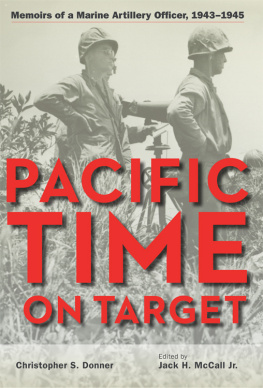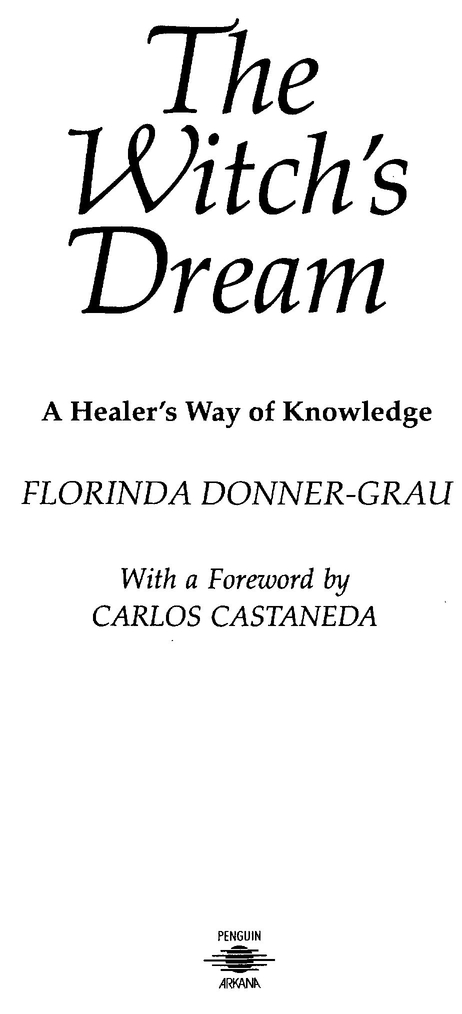Table of Contents
ARKANA
THE WITCHS DREAM
Florinda Donner-Grau is an anthropologist and the author of Shabono and Being-in-Dreaming. She lives in Los Angeles, California and Sonora, Mexico.
TO ALL THOSE
WHOM I CANNOT
MENTION BY NAME
Foreword
The work of Florinda Donner-Grau has a most special significance for me. It is, in fact, in agreement with my own work, and at the same time it deviates from it. Florinda Donner-Grau is my co-worker. We are both involved in the same pursuit ; both of us belong to the world of don Juan Matus. The difference stems from her being female. In don Juans world, males and females go in the same direction, on the same warriors path, but on opposite sides of the road. Therefore, the views of the same phenomena obtained from those two positions have to be different in detail but not in flavor.
This proximity to Florinda Donner-Grau under any other circumstance would unavoidably engender a sense of loyalty rather than one of ruthless examination. But under the premises of the warriors path, which we both follow, loyalty is expressed only in terms of demanding the best of ourselves. That best, for us, entails total examination of whatever we do.
Following don Juans teachings, I have applied the warriors premise of ruthless examination to Florinda Donner-Graus work. I find that for me there are three different levels, three distinct spheres, of appreciation in it.
The first is the rich detail of her descriptions and narrative. To me, that detail is ethnography. The minutiae of daily life, which is commonplace in the cultural setting of the characters she describes, is something thoroughly unknown to us.
The second has to do with art. I would dare say that an ethnographer should also be a writer. In order to place us vicariously in the ethnographic horizon he or she describes, an ethnographer would have to be more than a social scientist; an ethnographer would have to be an artist.
The third is the honesty, simplicity, and directness of the work. It is here, without doubt, where I am most exigent. Florinda Donner-Grau and I have been molded by the same forces; therefore, her work must conform to a general pattern of striving for excellence. Don Juan has taught us that our work has to be a complete reflection of our lives.
I cant help having a warriors sense of admiration and respect for Florinda Donner-Grau, who in solitude and against terrifying odds has maintained her equanimity, has remained faithful to the warriors path, and has followed don Juans teachings to the letter.
CARLOS CASTANEDA
Authors Note
The state of Miranda, in northeastern Venezuela, was populated by Carib and Ciparicoto Indians during prehispanic times. During colonial times, two other racial and cultural groups became prominent there: the Spanish colonizers and the African slaves that the Spaniards brought to work their plantations and mines.
The descendants of those Indians, Spaniards, and Africans make up the mixed population that presently inhabits the small hamlets, villages, and towns scattered over the inland and coastal areas.
Some of the towns in the state of Miranda are famous for their healers, many of whom are also spiritualists, mediums, and sorcerers.
In the midseventies, I made a trip to Miranda. Being at that time an anthropology student interested in healing practices, I worked with a woman healer. To honor her request for anonymity, I have given her the name Mercedes Peralta, and I have called her town Curmina.
As faithfully and accurately as I could, and with the healers permission, I recorded in a field diary everything about my relation with her, from the moment I came to her house. I also recorded separately what some of her patients told me about themselves. The present work consists of portions of my field diary and the stories of those patients who were selected by Mercedes Peralta herself. The parts taken from my field diary are written in the first person. I have, however, rendered the patients stories into the third person. This is the only liberty I have taken with the material, other than changing the names and the personal data of the characters of the stories.
PART ONE
It began for me with a transcendental event; an event that shaped the course of my life. I met a nagual. He was an Indian from northern Mexico.
The dictionary of the Spanish Royal Academy defines nagual as the Spanish adaptation of a word that means sorcerer or wizard in the Nahuatl language of southern Mexico.
Traditional stories of naguals, men of ancient times who possessed extraordinary powers and performed acts that defied the imagination, do exist in modern Mexico. But in an urban or even rural setting today, actual naguals are purely legendary. They seem to live only in folktales, through hearsay, or in the world of fantasy.
The nagual I met, however, was real. There was nothing illusory about him. When I asked him out of well-meant curiosity what made him a nagual, he presented a seemingly simple, and yet utterly complex idea as an explanation for what he did and what he was. He told me that nagualism begins with two certainties: the certainty that human beings are extraordinary beings living in an extraordinary world; and the certainty that neither men nor the world should ever be taken for granted under any circumstances.
From those sweet, simple premises, he said, grows a simple conclusion: Nagualism is at once taking off one mask and wearing another. Naguals take off the mask that makes us see ourselves and the world we live in as ordinary, lusterless, predictable, and repetitious and put on the second mask, the one that helps us see ourselvesand our surroundingsfor what we really arebreathtaking events that bloom into transitory existence once and are never to be repeated again.
After meeting that unforgettable nagual, I had a moments hesitation due solely to the fear I felt on examining such an imposing paradigm. I wanted to run away from that nagual and his quest, but I could not do it. Some time later, I took a drastic step and joined him and his party.
But this is not a story about that nagual, although his ideas and his influence bear heavily in everything I do. It is not my task to write about him or even to name him. There are others in his group who do that.
When I joined him, he took me to Mexico to meet a strange, striking womanwithout telling me that she was perhaps the most knowledgeable and influential woman of his group. Her name was Florinda Matus. In spite of her worn, drab clothes, she had the innate elegance of most tall, thin women. Her pale complexioned face, gaunt and severe, was crowned by braided white hair and highlighted by large, luminous eyes. Her husky voice and her joyful, youthful laughter eased my irrational fear of her.
The nagual left me in her charge. The first thing I asked Florinda was whether she was a nagual herself. Smiling rather enigmatically, she further refined the definition of the word. She said, To be a sorcerer or a wizard or a witch doesnt mean to be a nagual. But any of them can be one if he or she is responsible for and leads a group of men and women involved in a specific quest of knowledge.
When I asked her what that quest was, she responded that for those men and women it was to find the second mask, the one that helps us see ourselves and the world for what we really arebreathtaking events.









![Blackstone Audio Inc. - Ordeal by hunger: [the story of the Donner Party]](/uploads/posts/book/167807/thumbs/blackstone-audio-inc-ordeal-by-hunger-the.jpg)



